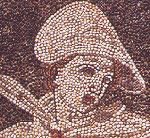[I just finished reading this short novel by Hemingway, so here's my review of it.]
Hemingway is very good at creating a kind of naturalistic tale that I don't care for at all. Even so, I find myself being drawn back into his stories, more as a writer than as a reader. The artist in me gets curious. I realize after reading a story that I don't remember how the characters spoke or how they looked. For that matter, I don't remember ever feeling the need to know more about them, yet I clearly remember the events that happened in their lives.
So why do I keep reading a story in which I don't really know the characters—or is it that I know more about them than I realize? These are questions I would like to answer, because then maybe I could stop reading Hemingway and be satisfied.
I think it's partly the male in me that draws me back to Hemingway, since his stories have an unusually masculine—and also intellectual—style and mythos about them. They're like reading a much smarter Zane Grey. Lines are drawn sparsely—little more than thin, gray sketch marks—yet a single strike may carry all the drama of a gunshot. Where Zane Grey may have a gun battle raging in every other chapter, first when a furious bear attacks, then Indians, then more Indians, then a corrupt sheriff, and so on, Hemingway may save that single gunshot until it carries the weight of everything, like spiritual death, loss, tragedy, alienation, hopelessness, and destitution—always destitution.
The masculinity of the story may also explain why I don't really see the intimate details of Hemingway's characters. A lot of men—especially the most outwardly masculine ones—tend to deal with each other at arm's length, taking what they need and nothing more, and not dwelling too long on “inconsequentials”. (Personally, I think this is caused more by mind-body disintegration than by the nature of masculinity, but that's a topic for a different discussion.) In any case, all of Hemingway's characters are rendered in this fashion. You know about them only by the way they flick their cigarette or cast their reel.
[Spoilers Follow]
A Farewell to Arms doesn't really have a plot in the proper sense, meaning a purposeful progression of events. The story consists mainly of plodding reactions, not purposeful pro-action. The question is decidedly
not: what is Lieutenant Henry’s goal and how will he achieve it despite the war? Rather, the question is: Will Henry emerge from the challenge of war intact, slightly altered, nearly destroyed, or not at all? In other words: What will the war do
to Henry?
He is “caught up in” turmoil, but he does not create the turmoil; it creates him. Nature and cruel fates always act upon him, and always he must react. I just don't see how a good plot could ever come from such a victim-centered viewpoint.
In college Literature courses, this book is often presented as a propaganda story against war. But if this were true, one would expect the war to be shown as the cause of Henry's troubles, even if only the ultimate cause. In fact, it doesn't matter that Henry is caught up in a war. He could be entangled in just about any series of unfortunate events, say a revolution or a volcanic eruption, because the war itself is rarely mentioned. Even his decision to join the war was an afterthought, like a young man deciding between buying this car or buying that one.
I think there's a much deeper battle going on in this story, something more frightening than what you'd find in the more colloquial and homey naturalism of, say, a Sinclair Lewis or F. Scott Fitzgerald. Hemingway puts Henry in the worst of circumstances—any circumstance will do—and then makes him do nothing except wait, sometimes lie, and finally run away. Henry rarely acts except to save himself, never pro-actively to gain or keep his values. And this is why I don't think Hemingway cared nearly as much about the war as he did about his own tortured psychological state.
So, naturally, Henry had to lose his wife and child—that is, his highest values. It would be wrong to say that he also lost his
self, because he never attained it nor even thought of pursuing it. Perhaps this is where Hemingway inadvertently confesses his own view of mankind's place in this universe—not as initiator, but as pawn—and worse, pawn of a mean and angry universe. No wonder Hemingway was an alcoholic.
Labels: books, reviews

